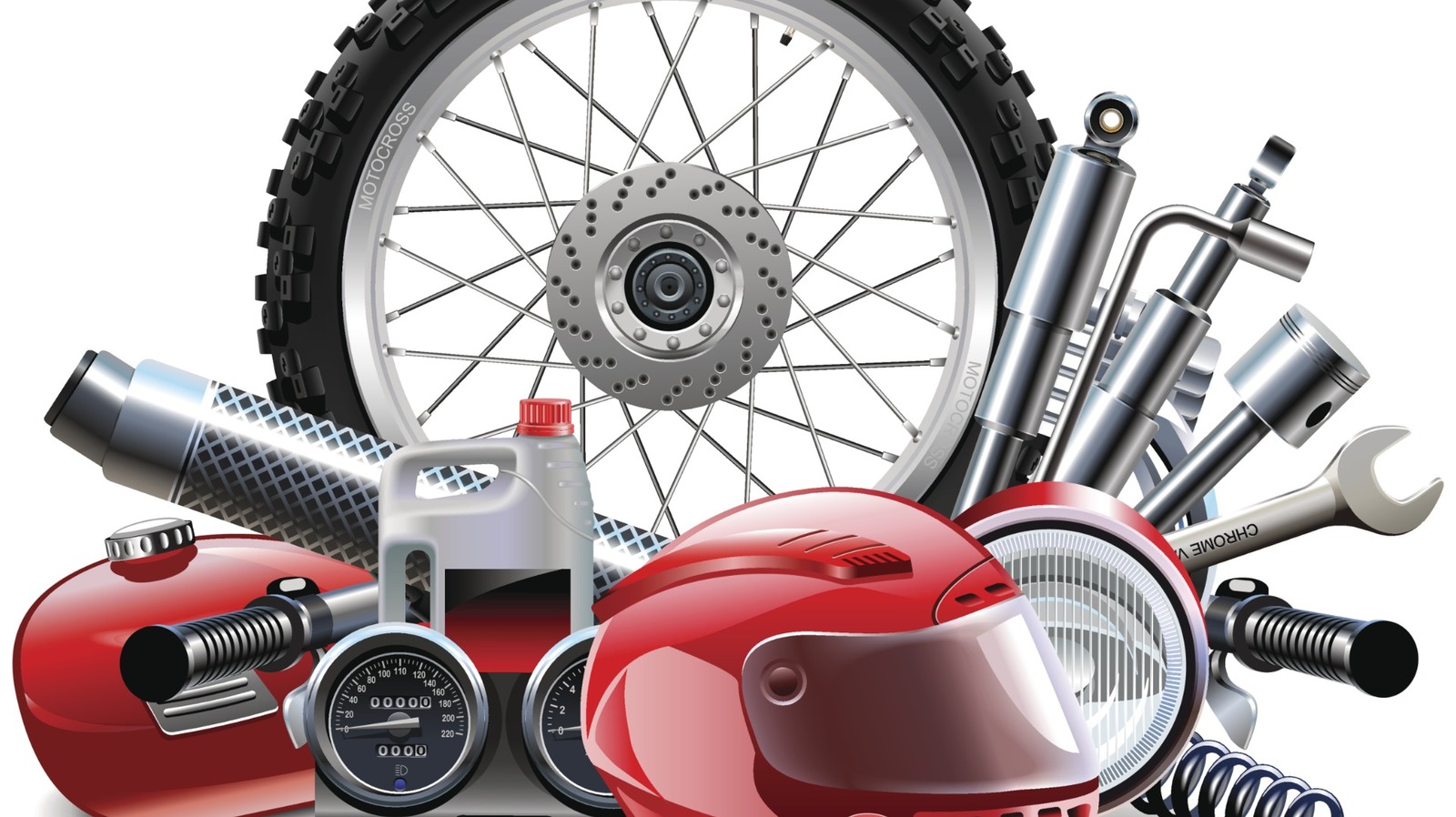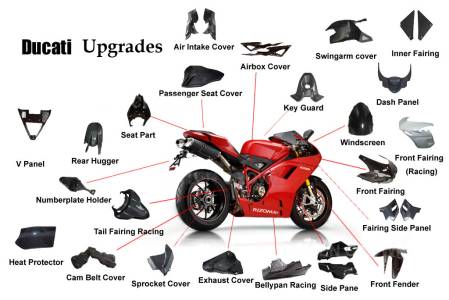Optimize Your Speed with High-Efficiency OEM Parts New Zealand
Optimize Your Speed with High-Efficiency OEM Parts New Zealand
Blog Article
Discover the Important Motorcycle Parts You Required for Optimum Performance
Recognizing the important parts of a motorbike is fundamental for achieving peak efficiency. Each element, from the engine to the stopping system, plays a critical function in overall capability and safety. Regular upkeep can prevent unforeseen failings and improve the riding experience. Many riders neglect the ins and outs of these systems. Finding just how they collaborate can result in a much more efficient trip. What critical elements should every biker focus on?
The Engine: The Heart of Your Motorcycle
The engine acts as the core element of a motorcycle, driving its performance and specifying its capacities. It is responsible for converting fuel into power, which powers the bike ahead. Various types of engines are employed, consisting of single-cylinder, V-twin, and inline configurations, each offering distinct attributes matched for various riding styles and functions. The engine size, generally determined in cubic centimeters (cc), substantially influences efficiency, with bigger engines normally offering even more power and torque.Furthermore, the engine's style and technology, such as gas injection systems or air-cooling versus liquid-cooling, affect efficiency and integrity. Maintenance is essential for peak procedure; variables like routine oil changes and monitoring trigger connects guarantee longevity. Riders frequently think about an engine's responsiveness and level of smoothness, as these qualities boost the overall riding experience. Ultimately, the engine remains a critical element that defines not only the bike's performance but additionally the rider's connection to the device.
The Transmission: Moving Gears Efficiently
The transmission plays a necessary role in a motorbike's performance, particularly in the mechanics of gear shifting. Comprehending just how to move gears efficiently can improve the general riding experience, while normal upkeep assurances peak performance. Proper focus to these facets can greatly influence the long life and effectiveness of the motorbike.

Equipment Shifting Mechanics
Smooth equipment moving is crucial for suitable motorbike performance, significantly impacting both velocity and control. The technicians of equipment shifting include the communication in between the clutch, gear lever, and transmission system. When a motorcyclist engages the clutch, it disengages the engine from the transmission, enabling an equipment adjustment without damaging the elements. A well-timed launch of the clutch, combined with accurate movement of the equipment lever, assists in a seamless adjustment between equipments. This process guarantees that the engine runs within its finest power band, improving efficiency. Motorcycle Parts Auckland. Furthermore, understanding the gear proportions and their result on speed and torque can assist motorcyclists make informed choices throughout changes, inevitably adding to an extra receptive and enjoyable riding experience
Maintenance Tips Significance
Regular upkeep plays a crucial role in ensuring that the transmission system runs efficiently, allowing for smooth equipment shifts. Frequently checking and altering the transmission liquid is crucial, as old liquid can cause boosted friction and wear. In addition, evaluating the clutch for wear assurances peak engagement and disengagement, preventing slippage throughout equipment modifications. Lubrication of relocating parts is just as essential to decrease rubbing and enhance efficiency. Bike proprietors should additionally keep an eye on for leaks and uncommon sounds, as these can suggest underlying issues. By sticking to these maintenance tips, cyclists can extend the lifespan of their transmission system, guaranteeing that equipment shifts stay seamless and contributing to the total efficiency of their motorcycle.
The Braking System: Ensuring Security on Every Trip
Braking systems are basic parts that straight influence a motorcycle's security and efficiency. They include different components, consisting of brake pads, blades, calipers, and hydraulic lines, all interacting to ensure reliable slowdown. The kind of stopping system-- normally either disc or drum-- impacts responsiveness and quiting power.Regular upkeep is necessary to promote peak efficiency; worn brake pads can lead to reduced performance and raised quiting distances. In addition, the quality of brake fluid must be monitored, as it can take in moisture gradually, endangering stopping efficiency.Riders must likewise take into consideration the relevance of anti-lock stopping systems (ABDOMINAL), which avoid wheel lockup throughout sudden quits, improving overall safety. Properly working brakes are not simply regarding quiting; they instill self-confidence in the motorcyclist, permitting for more secure navigating via numerous terrains. Eventually, a trusted stopping system is crucial for delighting in every ride with comfort.
The Suspension: Enhancing Comfort and Control
A well-functioning suspension system greatly contributes to a motorcycle's total efficiency, matching the performance of the stopping system. The suspension plays a considerable role in absorbing shocks from unequal surface areas, guaranteeing a smoother trip while keeping tire contact with the roadway. This call is vital for both stability and control, allowing bikers to browse edges with confidence and precision.Different types of shock absorber, such as telescopic forks or mono-shocks, supply differing levels of comfort and handling. Appropriately tuned suspension boosts responsiveness, offering the motorcyclist with a more connected feel to the motorcycle. Routine maintenance checks are very important to determine the suspension elements, including dampers and springs, are functioning at their finest. A reliable shock absorber not only raises the riding experience but additionally adds to the durability of various other motorcycle components by lessening damage. Therefore, spending in top quality suspension is essential for any significant motorcycle fanatic.
The Tires: Attaching You to the Road
Tires play an important duty in a motorbike's performance, working as the key link between the road and the cyclist. Understanding the different kinds of tires readily available can substantially affect taking care of and safety. Furthermore, routine upkeep is vital to assure peak tire performance and durability.
Tire Types Explained
Exactly how do various tire kinds influence a motorbike's performance? Tire types play a vital function in figuring out a motorcycle's handling, hold, and stability. Sporting activity tires, created for high efficiency, offer boosted grip and responsiveness on smooth roadways, making them perfect for racing and hostile riding. Alternatively, visiting tires prioritize durability and convenience, providing a smoother experience for long-distance travel. Off-road tires, identified by their tough tread patterns, excel in grip on unpaved surface areas, suitable for journey lovers. Furthermore, dual-sport tires blend characteristics from both on-road and article off-road categories, accommodating functional riding demands. Ultimately, picking the best tire kind is vital for maximizing performance, guaranteeing safety, and boosting the overall riding experience.
Upkeep Tips Offered
While riding on the road, preserving ideal tire problem is important for safety and security and performance. Consistently checking tire pressure is essential, as under-inflated tires can cause poor handling and boosted wear. It is a good idea to examine walk depth regularly; worn tires compromise hold and security. In addition, bikers ought to look for signs of damage, such as cracks or bulges, which can indicate the demand for replacement. Revolving tires regularly guarantees also wear, improving longevity. Moreover, maintaining tires clean from debris and staying clear of too much aesthetics can extend their lifespan. Ultimately, preserving correct positioning and equilibrium adds to peak performance, minimizing anxiety on various other bike components. Sticking to these maintenance ideas will significantly boost the overall riding experience.
The Fuel System: Fueling Performance and Efficiency
The fuel system plays a vital duty in taking full advantage of a motorbike's efficiency and performance, as it assures the optimum distribution of gas to the engine. It makes up a number of vital components, including the gas storage tank, fuel pump, fuel filter, and gas injectors or carburetor. Each part should operate effectively to assure a smooth and effective ride.The gas container stores gas and supplies it to the engine via the fuel pump, which produces the essential stress. A fuel filter prevents impurities from going into the engine, while the injectors or carburetor mix gas with air for combustion.Proper upkeep of the fuel system is important; a blocked filter or malfunctioning injector can lead to reduced efficiency next and enhanced fuel intake. By validating that the gas system runs effectively, motorcyclists can enjoy enhanced throttle response, far better gas economic situation, and generally improved riding experience.
The Electric System: Powering Your Experience
An efficient electric system is essential for the overall performance and security of a motorbike, as it powers crucial elements such as the ignition, lighting, and various digital systems. This system includes the battery, read the article which stores energy, and the generator, responsible for producing power while the engine runs. The electrical wiring harness links these parts, making certain dependable power distribution.Additionally, integrates shield the system from overloads, while relays aid regulate high-current devices with low-power signals. A well-kept electrical system boosts performance by guaranteeing smooth beginnings and constant procedure of lights and signals, essential for cyclist exposure and safety.Regular checks of the battery's cost and connections are very important for avoiding electric failures. Bikers must additionally examine electrical wiring for damage, ensuring all parts function ideally. Eventually, a robust electrical system contributes significantly to the total performance and integrity of the motorcycle.
Regularly Asked Inquiries
Exactly how Often Should I Change My Motorcycle's Battery?
The regularity of motorcycle battery replacement depends on usage and upkeep (Bike Parts Wellington). Usually, batteries should be replaced every 3 to 5 years. Regular checks can help determine when a substitute is necessary for peak efficiency
What Devices Do I Need for Standard Motorcycle Upkeep?
For standard bike upkeep, one calls for vital tools such as an outlet collection, wrenches, screwdrivers, pliers, tire pressure gauge, and a torque wrench. These devices facilitate effective upkeep and assure the bike runs efficiently and safely.
Just How Can I Boost My Motorcycle's The rules of aerodynamics?
To enhance motorcycle aerodynamics, one should consider adjusting fairings, making use of windshield expansions, optimizing body placement, and minimizing total weight. These modifications help reduce drag, improving stability and gas effectiveness during trips.
What Are the Indications of a Failing Electrical System?
Indicators of a stopping working electrical system consist of dimming lights, problem starting, irregular tool readings, and blown fuses. Motorcycle Spares Christchurch. Uncommon smells or deterioration around battery terminals might likewise indicate underlying concerns needing immediate focus for safety and security and performance

Exactly how Do I Pick the Right Oil for My Motorcycle?
When selecting oil for a motorcycle, one must take into consideration the maker's specifications, viscosity ratings, and the kind of riding. In addition, artificial versus conventional oil can affect performance and engine protection, influencing the choice significantly. The engine size, usually measured in cubic centimeters (cc), significantly affects efficiency, with larger engines typically providing even more power and torque.Furthermore, the engine's design and innovation, such as gas injection systems or air-cooling versus liquid-cooling, affect effectiveness and reliability. A well-functioning suspension system greatly contributes to a motorcycle's overall performance, matching the efficiency of the braking system. The gas system plays an essential duty in making the most of a motorbike's efficiency and performance, as it assures the optimal delivery of gas to the engine. A fuel filter prevents pollutants from getting in the engine, while the injectors or carburetor mix gas with air for combustion.Proper maintenance of the gas system is important; a clogged up filter or malfunctioning injector can lead to decreased performance and raised gas usage. A well-maintained electric system boosts efficiency by making sure smooth begins and consistent operation of signals and lights, vital for rider presence and safety.Regular checks of the battery's cost and connections are essential for stopping electric failings.
Report this page